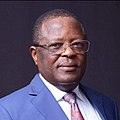| Name (Born-Died) | Portrait | Term of Office | Cabinet |
|---|
| Colonial Nigeria |
|---|
| 1 | Abubakar Tafawa Balewa (1912 –1966) |  | 1951 | 1954 | Macpherson |
|---|
| 2 | Inuwa Wada (1917– 2015) | | 1955 | 1 October 1960 |
|---|
| Federation of Nigeria |
|---|
| 2 | Inuwa Wada (1917– 2015) | | 1 October 1960 | May 1965 | Balewa (I • II) |
|---|
| 3 | Shehu Shagari (1925 –2018) |  | May 1965 | 16 January 1966 | Balewa (II) |
|---|
| 4 | Femi Okunnu (b. 1933) | | 6 July 1967 | 1975 | Gowon (Federal Executive Council) |
|---|
| 5 | Olusegun Obasanjo (b. 1937) |  | January 1975 | 29 July 1975 |
|---|
| 6 | Olufemi Olumide (1938–2020) | | 29 July 1975 | 1976 | Muhammed (Federal Executive Council) |
|---|
| 7 | Orho Esio Obada (1939–2020) | | 1976 | 1977 | Obasanjo (Federal Executive Council) |
|---|
| 8 | Oberu Aribiah (b. 1938) | | March 1977 | 24 July 1978 |
|---|
| 9 | Muhammed Shuwa (1939–2012) |  | 24 July 1978 | 1979 |
|---|
| 10 | Sunday Essang (1940–1991) | | December 1979 | October 1983 | Shagari (I) |
|---|
| 11 | Emmanuel Nsan (1932–2011) | | October 1983 | 1984 | Buhari (Federal Executive Council) |
|---|
| 12 | Hamza Abdullahi (1945–2019) | | 1984 | 1985 |
|---|
| 13 | Abubakar Umar (1925–2009) | | 1985 | 23 December 1987 | Babangida (Federal Executive Council) |
|---|
| 14 | Mohammed Kontagora (b. 1937) | | 23 December 1987 | 1993 |
|---|
| 15 | Barnabas Gemade (1928–2001) |  | August 1993 | 17 November 1993 | Shonekan (I) |
|---|
| 16 | Lateef Jakande (1929–2021) | | November 1993 | March 1995 | Abacha (Federal Executive Council) |
|---|
| 17 | Abdulkareem Adisa (1948–2005) | | March 1995 | December 1997 |
|---|
| 18 | Garba Ali Mohammed (b. 1949) | | December 1997 | June 1999 | Abubakar (Federal Executive Council) |
|---|
| 19 | Anthony Anenih (1933 –2018) | | June 1999 | July 2003 | Obasanjo (I) |
|---|
| 20 | Adeseye Ogunlewe (b. 1943) | | July 2003 | March 2006 | Obasanjo (II) |
|---|
| 21 | Obafemi Anibaba (b. 1944) | | March 2006 | September 2006 |
|---|
| 22 | Cornelius Adebayo (b. 1944) | | September 2006 | January 2007 |
|---|
| 23 | Hassan Muhammed Lawal (1954–2018) | | 17 December 2008 | 17 March 2010 | Yar'Adua (I) |
|---|
| 24 | Mohammed Daggash (b. 1960) |  | 6 April 2010 | July 2011 | Jonathan (I) |
|---|
| 25 | Mike Onolememen (b. 1965) | | July 2011 | November 2015 | Jonathan (II) |
|---|
| 26 | Babatunde Fashola (b. 1963) |  | 11 November 2015 | 29 May 2023 | Buhari (I • II) |
|---|
| 27 | Dave Umahi (b. 1963) |  | 21 August 2023 | Incumbent | Tinubu (I) |
|---|
|








